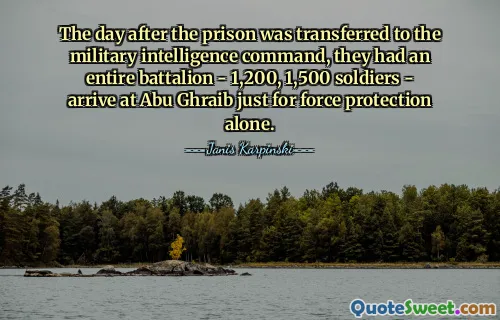Janis Karpinski is a retired U.S. Army Reserve officer who gained prominence during her time as a commander at Abu Ghraib prison in Iraq. Her leadership was under scrutiny following the prisoner abuse scandal that erupted in 2004. Karpinski became a central figure in the investigations, facing allegations of failing to supervise her troops effectively. Although she was later demoted, she argued that she was made a scapegoat for a larger systemic failure within the military. Throughout her career, Karpinski served in various roles, demonstrating her commitment to military service. She rose to the rank of Brigadier General and was the first female commander of a military police brigade in the U.S. army. Her experiences in Iraq and the subsequent fallout significantly impacted her view of military accountability and the treatment of prisoners. Post-military, Karpinski became an author and public speaker, sharing her insights from her experiences. She has spoken out about the need for reform within the military and greater accountability for leadership. Her narrative serves as a critical reflection on the moral challenges faced by military personnel and the consequences of their actions in war zones.
Janis Karpinski is a retired U.S. Army Reserve officer who gained notoriety for her command at Abu Ghraib prison during the controversial prisoner abuse scandal in 2004. She faced significant scrutiny and was later demoted, arguing that the military structure supported systemic issues beyond her control.
Throughout her military career, Karpinski served in various positions and made history by being the first female commander of a military police brigade. Her time in Iraq profoundly affected her views on military leadership and accountability, which were brought to light following the scandal.
After leaving the military, Karpinski became an author and speaker, advocating for reform within the military and emphasizing the importance of ethical conduct in warfare. Her experiences challenge us to consider the moral implications of military actions and the responsibilities of leaders in such environments.
Подробнее »
Today Birthdays
1887 -
Robinson Jeffers
1864 -
George Washington Carver
1936 -
Stephen Ambrose
1953 -
Pat Benatar
1949 -
George Foreman
1945 -
Rod Stewart
1936 -
Robert Woodrow Wilson
1938 -
Donald Knuth
1974 -
Hrithik Roshan
1956 -
Antonio Munoz Molina
1980 -
Sarah Shahi
1936 -
Al Goldstein
1939 -
David Horowitz
1955 -
Michael Schenker
1986 -
Abbey Clancy
1959 -
Chris Van Hollen
1989 -
Emily Meade
Подробнее »
